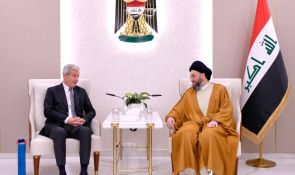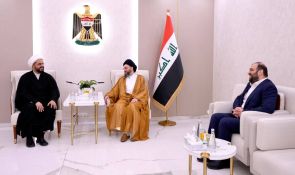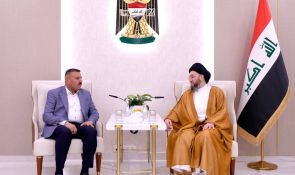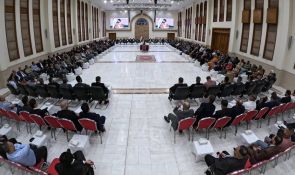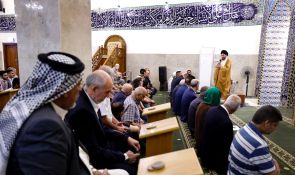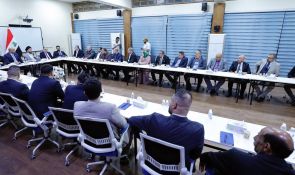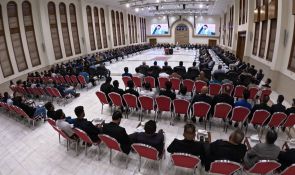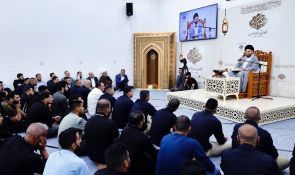Al-Hakeem: the religious authority is a red line and it is a national and legitimate duty to defend it.
Sayeed Amar al-Hakeem, head of the Islamic Supreme Council of Iraq expressed his optimism by holding the Arab summit in Baghdad within the positive responses of Arabs with it, calling for putting limits to the expectations and not to make high expectations about it and realize that the Arab summit is being held under difficult situations occurring inside the Arab world, which requires consideration to the Arab summit with in political realistically, calling on the government and security forces to take their responsibility to do its utmost for the success of the Arab summit in order to deliver the long waited message, which could enable Iraq to play a positive role in communicating with the Arabs, and to communicate with them to transfer the Iraqi experience to them, especially in countries witnessed a change in their political regimes.
His Eminence stressed that the centralization, decentralization and their argument had been settled within the Iraqi constitution, when considered Iraq a federal country, pointing out that the granting of more powers to the provinces will ease the burden on the federal government and facilitates the promises of providing the faster and better services to the citizens, adding that the guarantee to save the dignity of the state is not by the centralization but the guarantee comes from the satisfaction of citizens through the provision of services to them, noting that whenever Iraq turns into the decentralized whenever there is a better and faster service which brings the real dignity of the state, considering that decentralization will reduce significantly the deadly routine, bureaucracy in the ministries and will reduce the administrative and financial corruption through informing citizens on projects closely, which enhances the confidence of citizens and officials themselves, indicating that the decentralization will create a state of competition and generalizing right experience among the provinces and will benefit from the experts and energies, indicating that the citizen will be the observer to the level of government performance, warning that the centralization will push many of the provinces to make hasty decisions of forming regions which the Iraqis pay the price for these decisions, considering granting the constitutional powers for the local governments a step towards the construction, calling the Iraqi parliaments to amend Law No. 21 to suit the Constitution, emphasizing that the law has not been activated and it is vetoed because it did not adhere to the constitutional authority of provinces, reminding with the veto of Dr. Adel Abdul-Mahdi for the law, adding that the strategic and sovereign projects belong to the federal government whereas the rest of the projects are the duties of local governments. Al-Hakeem expressed his regret for the proposed amendments to the law which will lead for decreasing the powers granted to the provincial councils.
His Eminence said that burning the Holy Quran by one of the American soldiers inside one of the U.S. bases in Afghanistan, reflects on the state of cultural isolation which does not correspond with all the propositions that speak about harmony, peace and coexistence, acceptance of others, considering this act is as a result of hatred, rancor and weakness in the delivery of true culture in dealing with others by the country where this U.S. soldier belongs to, stressing that respect for the Muslim faith is the duty of all, stressing that coexistence among religions cannot be done without spreading the culture of harmony and acceptance of others.
Sayeed al-Hakeem considered that the phenomenon of (IMO), is a real expression of the absence of the social security and an expression of misunderstanding the freedom, technology and openness that are subject to frameworks and limitations, even in countries that have issued such ideas, adding that the phenomenon of "Imo" by wearing strange clothes and rings like skulls and making strange tattoos are strange acts far from the Arabic and Islamic traditions to the Iraqi people and may provide a conducive environment to use drug and wrongdoing as well, calling the Iraqi families from their moral responsibility, the media and civil society organizations to be awakened of these phenomena and to study their causes without resorting to force but to culture, thought and logic.
Sayeed al-Hakeem counted that the social justice is a fundamental principle for peaceful coexistence, recalling the World Day of Social Justice, indicating that coexistence requires ignoring differences and to accept the other’s opinion, calling for politicians not to involve Iraq in their political struggles in order the poor not to be the price paid for the parties’ disputes.


